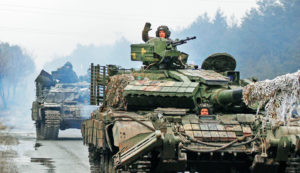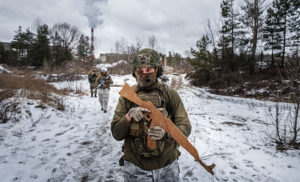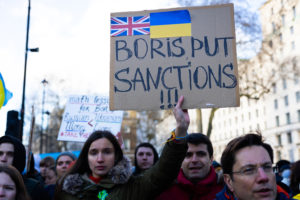In their desire to show solidarity with the embattled Ukrainians, the war in Ukraine has led some British commentators to slip the bounds of rationality — and none more so than the Chair of the Commons Defence Select Committee, Tobias Ellwood.
In a 2am tweet yesterday, Ellwood claimed: “Pleased to see powerful voices joining my call for a humanitarian partial or total NO FLY ZONE. What scale of war crimes, what numbers of civilian deaths must we witness — before Nato, the most powerful military alliance in the world, is tasked to intervene?”
While wars are not won by manic late-night tweets, they can nevertheless create much damage, in this case the risk of significantly escalating the conflict through creating unrealistic expectations among the British media class about what should be done, and among the Ukrainians about what will be done.
As the Biden administration’s spokeperson Jen Psaki very sensibly observed last night in her attempt to persuade journalists to tone down their rhetoric, a No-Fly Zone “would essentially mean the US military would be shooting down planes, Russian planes. That is definitely escalatory. That would potentially put us in a place where we’re in a military conflict with Russia. That is not something the President wants to do.”
As Psaki continued: “We are not going to have a military war with Russia with US troops. And [Biden] thinks it’s vitally important… to be direct with the public about that.”
Aside from dramatically increasing the risk of a nuclear exchange with Russia, the idea of a No-Fly Zone is a non-starter for many reasons. Even if it did not cause Russia to heighten its preparedness for a nuclear strike against us — which is surely reason enough — shooting down Russian jets would make Nato a military party to the conflict in a way that could soon spiral out of control. This ought to go without saying, but apparently it is now necessary to explain to Britain’s political class in very simple terms.
If Nato jets are flying from airbases in Central and Southeastern Europe to shoot down Russian aircraft, not only would the jets become military targets for Russia’s air defences, but those bases would themselves then become likely targets for Russian military retaliation, along with the basing locations of Nato air defence systems covering Western Ukraine. For all their diplomatic support of Ukraine and their supply of vital munitions to Ukrainian forces, countries such as Poland, Romania and Bulgaria will naturally shy away from a course of action likely to lead to Russian air and missile strikes on their own territory.
When advocates of a No-Fly Zone in Syria demanded such a course of action, it was before Russia entered the Syrian war, when Syrian airbases could reasonably be put out-of-action by long-range missile strikes without any serious risk of retaliation. This is not the case with the Ukraine war: is Ellwood seriously advocating that we strike the airbases in Russia and Belarus from which Russian aircraft are deployed? If so, then he should be explicit about what he is calling for, and the consequences that will ensue.
In any case, Russia has so far refrained from utilising its vast air superiority against Ukraine, for the possible reasons outlined in this excellent RUSI essay; namely, the lack of guided munitions to strike targets without causing widespread civilian deaths, the poor coordination of Russian air defence systems deployed in Ukraine which may cause jets to be downed by friendly fire, and the relative inexperience of Russian pilots when faced with competent opponents.
Monday was the first day in which Russian jets were visible in the conflict, flying close air support missions over the Kharkiv front. The only meaningful Russian air activity so far has been the use of helicopters to land airborne forces at the Hostomel airbase outside Kyiv in the war’s opening phase, to create a staging ground or potential bridgehead for the coming assault on the capital, and the limited use of attack helicopters to destroy Ukrainian ground positions and vehicles moving along the roads in convoy.
Instead, the most dreadful Russian bombardments of the war so far have been by ground-based artillery and long-range missile systems against the besieged city of Kharkiv on Monday and yesterday, causing great destruction and terrible civilian casualties among the city’s mostly Russian-speaking population, as well as on Ukrainian military installations elsewhere in the country.
The Russian way of war is based on heavy artillery barrages to soften up defences for a ground assault, unlike the Western approach in which aerial bombardment has become the dominant tool. A No-Fly Zone would do nothing to prevent this outcome, though rhetoric demanding one may well play a role in encouraging Russian decision-makers to intensify their artillery bombardment in search of a swift and overwhelming victory — one which would cause vast numbers of civilian casualties.
Our aim at this point should be to dissuade Putin as far as we can from deploying the artillery assets he has so far barely used, not in encouraging him to go all out before a Western response can realistically be organised. We do not want Putin to turn Kyiv into Nineties Grozny or Aleppo, and over-promising and under-delivering military support is an almost guaranteed way to speed up this outcome.
Perhaps Ellwood and others have had their expectations of what is possible or desirable raised by the NATO No-Fly Zone against Libya in 2011. Cautiously agreed to by Russia at the UN Security Council, it swiftly evolved into a close air support campaign against Libyan ground forces which allowed the rebels to defeat Gaddafi — an outcome which enraged Putin, and shaped his attitude to the following Syrian conflict.
But Gaddafi’s decrepit Libya is not Putin’s Russia and such a campaign is simply not achievable. Does Ellwood want us to strike Russian tanks and artillery in Ukraine? Again, he should be honest about what he is calling for and about what the Russian response would look like.
We should sigh with relief that Johnson yesterday uled out the No-Fly Zone idea that America has already dismissed, telling a Ukrainian journalist, with painful but realistic frankness, that “Unfortunately the implication of a [No-Fly Zone] is that the UK would be engaged in shooting down Russian planes … and be in direct combat” with Russia, and with consequences “truly difficult to control.”
Britain, and other Nato countries are already doing about as much as we can, by supplying Ukraine with the munitions making the Russian advance so costly, and by imposing great financial and diplomatic costs on Russia for Putin’s invasion. Beyond this, there is little more we can do other than encourage Russia towards meaningful negotiations before Kyiv is encircled and Ukraine’s bargaining hand is dramatically weakened.
Unless he has genuinely taken leave of his senses, Ellwood’s “hold me back!” posturing is possible purely because he knows the course of action he is calling for is already out of the question. He can raise the stakes in this dangerous and irresponsible manner because it wins him attention for the forthcoming Tory leadership contest, and because there are no negative consequences for him doing so.
That must change: the risk of escalation is too great for this rhetoric to be permitted at so dangerous a moment for Britain and Europe. The Conservative party must get a grip on Ellwood and others’ irresponsible late-night interventions in an already fevered online discourse: the whip has been withdrawn for far less.
Nothing good will come of such insane talk, for Britain, or most acutely, for the Ukrainians seemingly about to suffer a devastating campaign of artillery bombardment. Raising their expectations with false hopes at this stage of the war will not help them. But raising Russia’s threat calculus may harm them a great deal, at a time when Putin seems already poised to take his gloves off after a so-far half-hearted campaign. That is too great a price to pay for Ellwood’s desire to raise his profile — and the party needs to step in soon.
Disclaimer
Some of the posts we share are controversial and we do not necessarily agree with them in the whole extend. Sometimes we agree with the content or part of it but we do not agree with the narration or language. Nevertheless we find them somehow interesting, valuable and/or informative or we share them, because we strongly believe in freedom of speech, free press and journalism. We strongly encourage you to have a critical approach to all the content, do your own research and analysis to build your own opinion.
We would be glad to have your feedback.
Source: UnHerd Read the original article here: https://unherd.com





